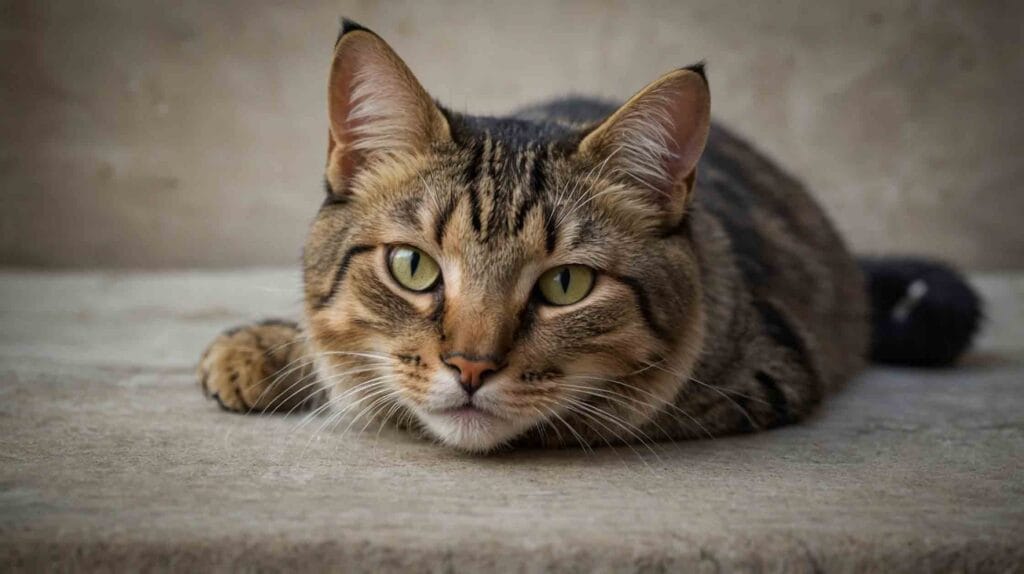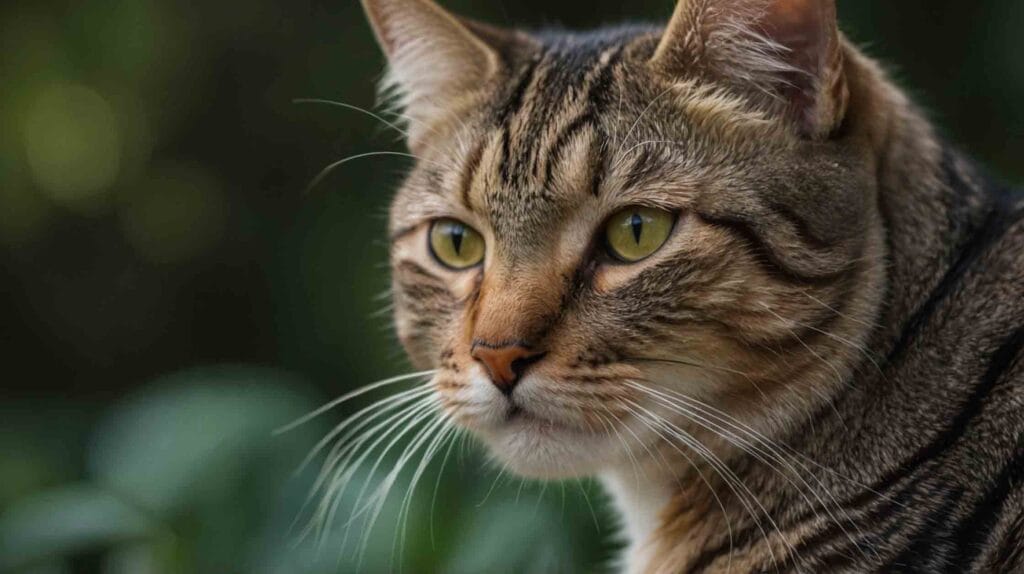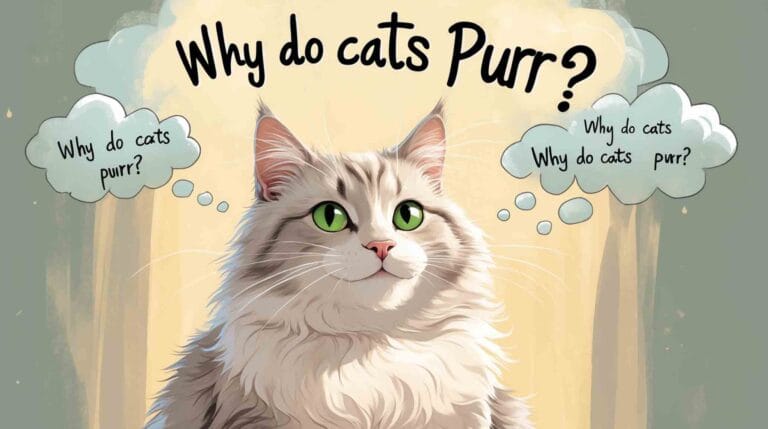One of the best known sounds in the animal kingdom is the purring of a cat. For cat lovers, that’s a sound that reaches the depths and they feel is calming, comfortable and affectionate.
But why do cats purr? Most people think of purring as when the content cat is reclined in the sun or cuddled up to you, but purring means more than that.
So why do cats purr and for what reasons? In this article, we will look in to the different reasons why cats purr, what the science is, and how this behavior affects both catkind and us humans.
The Science Behind Purring
A cat makes a purring sound through contractions and relaxation of laryngeal (voice box) muscles.
If these muscles vibrate, the vocal cords open and close very fast causing the classic purring sound.
Generally, this purring is between 25 and 150 Hz, which can be relaxing in a particular way.
The purring mechanism is thought to be a result of the brain, nerves and muscles communicating to create sound.
But what’s even more interesting is that cats purr at a frequency that could have therapeutic effects on their bodies to begin with.
But, according to some studies, the vibrations emitted during purring may actually help injured animals heal because it results in the production of growth factors and collagen.
Purring appears to be its own form of healing, which says so much about purring.
The purring as a sign of contentment.
One of the most common reasons a cat will purr is because they are happy.
While cats purr when they are well and truly relaxed and enjoying themselves, this happens in a safe secure environment usually with a little bit of snuggling.
This is a purr you hear when the cat is calm whether you pet him, he’s resting or around in a peaceful environment.
This is a common purr because in the case a cat is purring they are feeling emotionally safe, perhaps with their favorite human, being groomed, or in a sun spot.
In these cases, the sound reminds them of the bond which exists between their owner and cats. In such cases, a purring cat is just like the sigh of a human saying it had an exhausting day.
Purring as a communications tool.
Purring has two purposes, and in addition to being a sign of contentment, it’s a form of communication. Cats purr to tell us or another animal that we (or they) are not a threat.
For example, kittens will use purring to their mother when they need to be fed or soothed. This type of communication is most visible during the cat’s early life stages but continues to act in adult cats.
It is interesting to note that the purr of a cat might as well be modified in tone, frequency or intensity to get various types of meanings answered.
For instance, a cat will purr intensely when being petted or asked for attention, but gently and rhythmically purr can reflect happiness or a relaxed mood.
Cats can vary their purr to express their needs to other cats and humans.
Purring and Healing: A Biological Mechanism
It may also have something to do with your cat’s healing process. Research into purring has shown that a cat’s purrs fall in a range that can promote the repair of bone and tissue.

In addition, purring vibrations reportedly help heal broken bones, relief pain, and stimulate cell regeneration.
Cats purring at this frequency seem to have innate healing response capability in them which in addition to young kittens can be seen in older or sick cats.
The idea that cats purr as a “self healing” type behavior is one of the more interesting aspects of feline behavior, which might explain why cats purr when sick or injured.
Purring as a Stress Reliever
It can also be a self soothing mechanism. Purring may help cats to calm themselves down when they become anxious, stressed or frightened.
This most often happens in stressful situations, like a trip to the veterinarian, during a thunderstorm, or when in an unfamiliar place.
Purring cleans the tension out and their cats said, and brings a feeling of safety and calm. And secondly, certain vibrations made by purring activate the parasympathetic nervous system, the same system that slows down your heart rate, and induce a more relaxed, calmer state.
Even a cat’s purr will have the same calming effect on humans, calming anxiety and giving a sense of peace.
Purring: Discomfort or Pain
It’s commonly assumed that purring is part of a happy or relaxed cat, but that’s not always the case some cats purr when they feel discomfort or pain.
There is nothing about a cat purring that makes sense but why would a cat purr when they’re unwell? Many believe that since purring is the most widely accepted theory, cats use purring to comfort themselves in times of pain.

But cats may purr for reasons other than happiness when they’re trying to get better from an injury or health issue and feel stressed or in discomfort.
Other researchers think this behavior may have something to do with the cat’s pain or healing management in its own body.
In the context of purring, purring is a coping mechanism, passing discomfort of a physical and emotional kind.
Mother & Kitten Bond: The Function of Purring in Infant Development
Kittens start to purr from the moment they are born. In the first few days of a kitten’s life, purring can help bond with the kitten’s mother.
Newly born kittens use the expression to communicate with their mother that he’s hungry, sleeps, need attention and satisfied.
The survival and development of the emotions of this kitten depend on the mother and kitten’s communication.
While kittens can be heard purring, the soothing sound of a mother’s purr will help to secure as well as nurture the kittens, laying the foundation for the good mental health of the kitten.
Effects of Cat’s Purring Psychologically on Human
Human psychology is impacted by a cat‘s purring. It helps to reduce stress and anxiety in people and creates a sense of comfort and well being.
Scientists have discovered that purring, which takes place between 25 and 150 Hz, is especially soothing and that it both lowers blood pressure and induces relaxation.
For a lot of cat owners, the hearing of their cat purring is the same as an emotional connection. It’s an audible expression of love and trust and a reminder of the human and cat bond.
In this sense, purring is a mutual comfort, comfort for cats, and humans alike.
Other Animals That Purr: Are There Similarities?
Cats aren’t the only purriers, though animals of all kinds make purring noises.
While domestic cats purr, so do other animals like some big cat species (like cheetahs and cougars), but their purring is another thing altogether.
But in fact, these big cats purr as well, and for the same reason, it means it’s calm, content, and non aggressive.
And interestingly, there are lots of other animals that make noises which sound like purring eg guinea pigs, rabbits, and even species of civets.
Many of these sounds are signals for relaxation or used for communication in their social groups.
wrap up on Why Do Cats Purr?
One of the most interesting and multifaceted behaviors in animal kingdom is purring.
Cats purr for far more than to just communicate a sign of contentment, It’s a healing tool, a stress reliever and also simply acts as a form of communication.
Purring is commonly believed to be an expression of a happy cat, but it’s clear this behavior has many functions that help cats and humans cope with stress.
Even if you’re just sitting with your cat and enjoying a quiet moment of purrs or seeing them purr during a tense moment, it should be known that this sound isn’t so simple.
By looking into why cats purr, we can bring newer knowledge about why we love cats.
See More:
- How Long Do Cats Live? – Best vet Advice
- Why Does My Cat Bite Me? – Secret Expert Advice
- Why Do Cats Smell Good? – Unlocking the Mystery
- How to Stop Cats from Knocking on Doors?
- What B Vitamin is Good for Cats with Allergies?
FAQ: Why Do Cats Purr?
Q1: Are cats really happy when they purr?
Ans: No purr does not always showing happiness because some cats do purr in stress, hunger and fear.
q2: do cats control their purring?
Ans: Sorry we could not accurately but purring is no control of cats. It purely depends on health and the environment.
q3: do deaf cats purr?
Ans: Yes, all cats purr but deaf cats make sounds louder than others because they can hear sound.
q4: can human make purr?
Ans: Sure, every human has a unique purr sound. when our tongue long touched the roof of our mouth making the sound.
q5: why do cats purr when sleeping?
Ans: Cats relax when they sleep, which is why we hear a purring sound. Yes, they feel we are in a safe and super suitable place. A very low sound coming from the mouth it is called a purr sometimes it comes very loud if they in sick.
